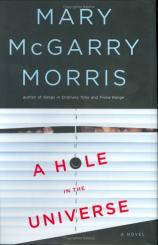Author Talk: March 2004
Q: Where did the idea for the novel originate? What research was required in terms of understanding Gordon's experience inside and outside of prison?
MMM: I was fascinated by the idea of culpability and guilt. How does so ordinary and decent a man as Gordon Loomis become involved in a murder and then how does he live with the consequences? How does he rationalize the wrong? Can he return to any kind of normal living? Beyond the nuts-and-bolts research, I did what a novelist does, I put myself in Gordon Loomis's head and heart.
Q: At the end of the novel, when Gordon finally begins to pull his life together, Dennis's is falling apart. Are we meant to believe that Dennis's character is in part defined by his need to feel superior to his brother or are we simply seeing the underside of his character at that point?
MMM: Dennis truly loves his brother, but he is a deeply flawed man. He has spent his life trying to outdistance the shame of his brother's crime. As so often happens in such a situation, the very sin that destroyed one brother's life has propelled the other's to greater heights. The pursuit of success and respectability has become Dennis's primary goals.
Q: Which of your characters were the most difficult to imagine or the hardest for you to understand and, in that, find a voice for them?
MMM: None. In order to create and develop vivid characters, I must know them so well that their voices simply come when summoned. Gordon's stoic guardedness, Delores's seductive breeziness, Jada's almost frantic hyperbole are all part of the texture as well as being a vital yet subtle method of telling the story. I find it to be the most effective way of pulling readers into the narrative so that they become engaged enough with the characters that they forget that the author is telling them a story.
Q: Describe your writing process. Has it been the same for all of your novels?
MMM: I begin with pen and paper. The first draft is written in longhand, with a very real, almost organic sensation of flow from the inside out. In the beginning, strong characters are more important than having a complete plot in mind. For me the story is always contained in the characters. When the first draft is completed, I type it onto the word processor and, from there, edit and revise so much that, in the end, I never know how many drafts I've gone through. Vanished, my first novel, was completed on a typewriter where an error or revision usually meant hours of retyping.
Q: What does the book's title mean to you?
MMM: "A hole in the universe" is the void, that emptiness a person feels when something vital is forever lost or removed from one's existence. First and foremost, of course, is the death of Janine Waters and her unborn child. Then, there is that vital part of Gordon that has been lost, his innocence and worthiness. No excuse, explanation, or absolution could ever change or erase what happened that terrible night when he blundered into the sleeping young woman's bedroom. Because of his actions, both in what he did and then failed to do, lives were destroyed. He will experience the loss of the young pregnant mother in the full and punishing burden of his guilt every day of his life. He does not try to inflict this burden on anyone else, but it is the only honorable life he can have. His guilt fills the gap in his being. In a sense, it gives him heft and substance and the only atonement he can understand or accept. It is the most he allows himself of feelings.
Q: While the novel is primarily Gordon's story, many of the other characters have their own unique trajectory. If you were to choose another character in A Hole in the Universe as the focus of a new novel, which one would it be?
MMM: YDelores Dufault or Jada Fossum. Delores—because she is so filled with hope, optimism, and belief in humanity. Her excesses and errors in judgment are part of the ebullience that fuels her through the muck of life. And Jada—because she is tough, resilient, and, like Delores, not afraid to take chances. Jada wants to be happy, wants to be safe. No matter how much neglect and rejection she has endured she refuses to be left behind.
Q: The reader learns bits and pieces about Gordon's crime, but ultimately we only experience what the characters in the novel feel. Why is it important that the reader does not know the precise details of the murder?
MMM: Details of the crime emerge gradually and often unbidden through Gordon's consciousness because that is how memory "speaks." I wanted the focus of the novel to be more about Gordon's reentry into freedom than a step-by-step depiction of the murder or his prison experiences.
Q: Your novel Fiona Range is also set in a fictional town named Dearborn and a city called Collerton. What is the significance of using the same setting?
MMM: The Dearborn in both Fiona Range and A Hole in the Universe is a very affluent town that borders a larger, poorer city I call Collerton. While both communities are fictional, they have real counterparts in America, places where the stark reality of poverty, hunger, and crime is often only a few minutes drive from the comfort and safety of tree-lined, suburban streets.
Q: What are you working on now?
MMM: My next novel is called The Lost Mother. It is about a family that is torn apart during the Great Depression. The story is told primarily through the eyes of eleven-year-old Thomas Talcott, who minds his younger sister, Margaret, while his father works. The children have lost their home and their beautiful mother, and no one will tell them why she left or when she'll return.








